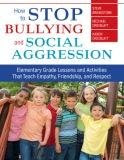As a bully prevention expert, I help teach kids to stop bullying other kids. There is no one bully prevention strategy – there are many effective approaches. Some focus on helping targets of bullying be less of a target.
I thought about this as I read stories about how Olympic champ Michael Phelps was bullied as a child. I appreciate how his mother, Debbie Phelps, focused on solutions to help her son, not the problem. Young Michael was bullied because of his looks and behavior. He was diagnosed with ADHD; couldn’t sit still, focus or be quiet. His mother stated, “he also grew unevenly; his arms were unusually long and made him a target of hurtful, insulting bullying.” Because of these struggles, Phelps described himself as, “quiet, introspective and angry growing up, deeply hurt of being bullied by other children.”
Ms. Phelps couldn’t undo her son’s ADHD, or his body type, so she focused on what she could do. She worked with his teachers to make sure they figured out ways to teach Michael successfully. She had him take Ritalin to treat his hyperactivity, and although there was some success with it, she took him off it when he requested – thus respecting and empowering him. She helped him study and when necessary, found tutors. And she found something he was good at and loved – swimming.
These actions helped Michael develop self-esteem and resiliency. But still, for a while, the bullying continued. "He got a hard time about being a swimmer and not a football or lacrosse player," said one high-school classmate. However, mother and son turned the challenge into a strength. "The bullying and adversity made him be stronger and work harder," his mother is quoted.
Michaels story should not make us think that being bullied is advantageous because it toughens a kid up or will turn targets into champions. That is faulty logic with no basis in fact. However, it does show that there are many strategies parents can use when their child is bullied. Addressing challenges proactively can lead to stopping the bullying and developing a child with resiliency and good self-esteem.
If your child is being bullied:
· Work with your child’s teachers to make sure your child is safe, physically and emotionally. Discuss how you want them to respond if they witness hurtful behavior by other children. Also, let them know how you want them to respond if your child acts inappropriately
· With your child, determine where it is safe to be, in school and out, where they won’t be bullied or mistreated.
· Discuss the qualities they want in friends and how to respond if friends do not treat them respectfully.
· Together, work on developing social skills that will be appreciated by their peers.
· Help your child determine their interest in activities and hobbies such as sports, music, theater, computer games, and crafts. Help your child get together with others who are interested in the same activities. As necessary, provide physical training to bring them up to a level that will be valued by their peers.
· Discuss how to respond, effectively yet non-violently, if someone does or says something that is abusive or hurtful.
· Talk about when to go to you or another trusted adult if the bullying continues. Also, discuss the difference between tattling and telling (it is not tattling if they are getting help for a situation they tried to resolve or found to be too dangerous).
- Steve
I’m interested in hearing your ideas about helping targets of bullying deal with the challenge. Post here or email me at Steve@BalanceEducationalServices.com



1 comment:
My name is Nathan Finch and i would like to show you my personal experience with Ritalin.
I am 32 years old. Have been on Ritalin for 2 years now. This drug has saved my life. I have seen drastic differences between times in my life when I was taking it and when I was not. I failed out of one school and graduated top of my class in the next. Floated from job to job and then became very successful. I don't like the way I feel when I am taking it (I'm boring -- no personality) so, I time my doses to help me in the office or when I have to focus on mundane task's at home like paying bills, taxes etc. and then go without it when I'm recreating.
I have experienced some of these side effects-
Initially some apatite suppression, insomnia and slight gitters. This was corrected by reducing my afternoon dose.
I hope this information will be useful to others,
Nathan Finch
Post a Comment